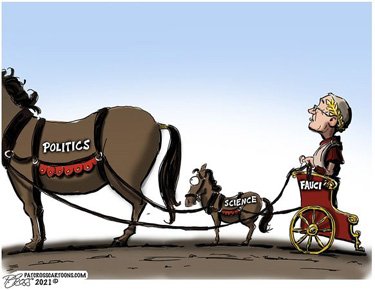
Leighton Woodhouse points out the intrinsic irony of calls for “Faith in Science.”
In The Revolt of the Public, Martin Gurri traces the exalted status of the modern scientist to the mythical figure of the early twentieth century renegade scientific genius, embodied most famously by Albert Einstein. Einstein, Gurri reminds us, was hardly a creature of the academy. He nearly dropped out of high school, and when he began publishing his scientific insights he was working not at a university but at the patent office. But Einstein’s singular genius, combined with his tenacious devotion to The Truth, made him first the equal and then the superior of every credentialed academic in the world. Like Copernicus, the intrepidness of Einstein’s spirit and the independence of his mind elevated him above the banal muck of human affairs, bringing him a step closer to the gods of nature.
This mythological image, Gurri writes, remains the template for our popular conception of the professional scientist. But the myth is wildly at odds with the reality of what science is today.
The modern scientific research industry is like a cross between a giant perpetual motion machine and a game of musical chairs. Scientific research is underwritten, in large part, by a steady stream of government funding. To keep the lights on in their labs, scientists need to tap into that stream. They do so by designing research projects that conform to whatever the government prioritizes at any particular moment. If, for instance, there was just a major terrorist attack and Congress was concerned about the threat of bioterrorism, scientific research that related to that concern would be likely to be fast tracked for funding, so it may be a good time for a savvy principal investigator to start pitching projects aimed at developing vaccines for bioengineered pathogens. The successful scientist is the one who is particularly adept at writing fundable grant applications pegged to some politically salient research objective, and then generating laboratory results that make some sort of incremental progress toward that objective to justify a renewal of that grant funding in the next cycle.
The modern professional scientist is thus less like Albert Einstein than like his co-workers at the patent office. He is a bureaucrat, albeit a highly technical one. His goal is, to be sure, to seek The Truth, but only within the very narrow parameters of what other bureaucrats and politicians have deemed to be questions worth asking.
Anthony Fauci is the Platonic form of the scientist-technician-bureaucrat, which is why he has held his position as one of the top scientists in the nation for decades and through multiple administrations. As a creature of both science and politics, he has made himself indispensable as an interface between the two worlds and as the individual best positioned to mold the former to suit the needs of the latter. After 9/11, he transformed NIH into the agency at the front line of defending America against the imminent threat of jihadis armed with weaponized plague viruses. He championed “gain-of-function” research, which essentially meant building those superviruses before the terrorists did, the better to find vaccines for them. And once the Islamic terrorist threat faded a bit from our collective memory, he re-tooled this heftily-funded research into humanity’s front line of defense against Mother Nature, “the worst bioterrorist.” Unfortunately for Fauci, in the process, he may have — oops! — created one of the biggest pandemics in human history. …
At every such juncture, we’ve been admonished to “believe the science.” But this is not science; it’s politics. Science demands a reflexive posture of skepticism toward received wisdom, tempered by trust in empirical evidence. Bowing habitually to expert authority on the strength of titles and credentials is the antithesis of the scientific mindset. It is precisely what Democrats adopted the “party of science” moniker to reject: willful obedience to those who hold cultural and political power.





Seattle Sam
Science demands that evidence and contra-evidence be assessed and challenged. You start with a hypothesis and use evidence to prove or disprove it. Politicians like Fauci start with the conclusion they’ve reached and work backwards to see if they can find supporting evidence and to suppress any contrary evidence. That’s how we got mask mandates.
Boligat
The cartoon is all wrong. The cart goes before the science horse.
Mike-SMO
“Science” is to slow and unpredictable for the needs of the Media and the Ruling Class, so they have created a narrative of science stringing sort-of-relevant trinkets into a “story” that can be “sold” in service to their political goals.
Please Leave a Comment!